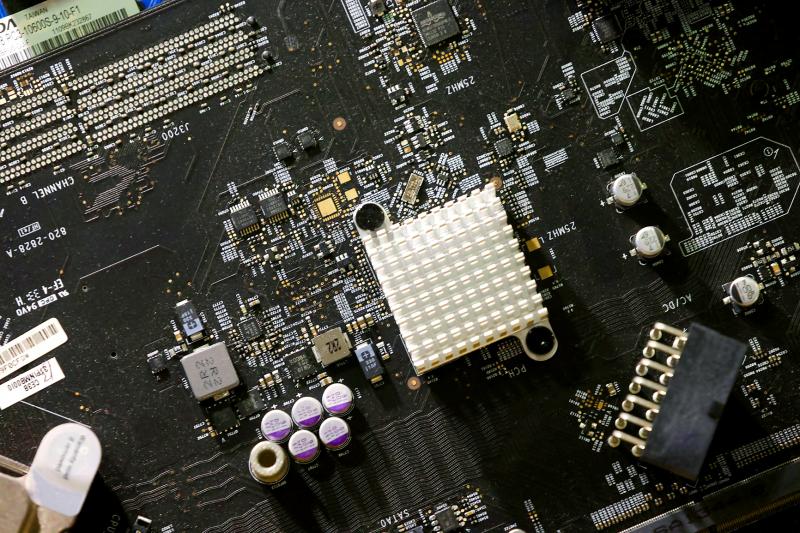GlobalFoundries Inc, the biggest US-based provider of made-to-order semiconductors, gave a bullish forecast for the current quarter, indicating the rush to get chips continues amid industry-wide shortages.
Sales would be US$1.88 billion to US$1.92 billion in the period ending next month, the Malta, New York-based company said in a statement on Tuesday.
Profit, excluding certain items, would be US$0.21 to US$0.27 a share. Those predictions compare with analysts’ average estimates of US$1.84 billion and US$0.14 a share.

Photo: Reuters
GlobalFoundries, majority owned by the government of Abu Dhabi, began life as a publicly traded company in October last year. The chipmaker, which is a fraction of the size of market leader Taiwan Semiconductor Manufacturing Co (台積電), is trying to carve out a larger slice of the market for outsourced semiconductor production.
Chief executive officer Tom Caulfield and his counterparts at other chipmakers are trying to convert the demand spike into long-term commitments from customers with the aim of stabilizing their growth and profitability.
They also hope to increase capacity by using proposed government incentives to build facilities in the US and Europe.
Investors should have confidence that the industry is going to avoid past cycles of boom followed by gluts if sales double as projected to US$1 trillion in 10 years, Caulfield said in an interview.
Current plans for factory expansion still would not keep up with that pace of growth, he said.
Furthermore, GlobalFoundries is only adding capacity when it gets financial commitments from customers who are seeking guaranteed supply.
Chipmakers are no longer building plants based on forecasts hoping orders will show up, he said.
GlobalFoundries shares have increased 19 percent to US$56.05 since October last year, when a slice of the company began trading on the public markets, beating overall gains by chip stocks. They rose about 3.5 percent in extended trading following the report.
Fourth-quarter revenue jumped 74 percent to US$1.85 billion. Profit was US$0.18 a share, excluding certain items.
Analysts, on average, projected US$1.81 billion and US$0.09, data compiled by Bloomberg showed.

SEEKING CLARITY: Washington should not adopt measures that create uncertainties for ‘existing semiconductor investments,’ TSMC said referring to its US$165 billion in the US Taiwan Semiconductor Manufacturing Co (TSMC, 台積電) told the US that any future tariffs on Taiwanese semiconductors could reduce demand for chips and derail its pledge to increase its investment in Arizona. “New import restrictions could jeopardize current US leadership in the competitive technology industry and create uncertainties for many committed semiconductor capital projects in the US, including TSMC Arizona’s significant investment plan in Phoenix,” the chipmaker wrote in a letter to the US Department of Commerce. TSMC issued the warning in response to a solicitation for comments by the department on a possible tariff on semiconductor imports by US President Donald Trump’s

The government has launched a three-pronged strategy to attract local and international talent, aiming to position Taiwan as a new global hub following Nvidia Corp’s announcement that it has chosen Taipei as the site of its Taiwan headquarters. Nvidia cofounder and CEO Jensen Huang (黃仁勳) on Monday last week announced during his keynote speech at the Computex trade show in Taipei that the Nvidia Constellation, the company’s planned Taiwan headquarters, would be located in the Beitou-Shilin Technology Park (北投士林科技園區) in Taipei. Huang’s decision to establish a base in Taiwan is “primarily due to Taiwan’s talent pool and its strength in the semiconductor

An earnings report from semiconductor giant and artificial intelligence (AI) bellwether Nvidia Corp takes center stage for Wall Street this week, as stocks hit a speed bump of worries over US federal deficits driving up Treasury yields. US equities pulled back last week after a torrid rally, as investors turned their attention to tax and spending legislation poised to swell the US government’s US$36 trillion in debt. Long-dated US Treasury yields rose amid the fiscal worries, with the 30-year yield topping 5 percent and hitting its highest level since late 2023. Stocks were dealt another blow on Friday when US President Donald

UNCERTAINTY: Investors remain worried that trade negotiations with Washington could go poorly, given Trump’s inconsistency on tariffs in his second term, experts said The consumer confidence index this month fell for a ninth consecutive month to its lowest level in 13 months, as global trade uncertainties and tariff risks cloud Taiwan’s economic outlook, a survey released yesterday by National Central University found. The biggest decline came from the timing for stock investments, which plunged 11.82 points to 26.82, underscoring bleak investor confidence, it said. “Although the TAIEX reclaimed the 21,000-point mark after the US and China agreed to bury the hatchet for 90 days, investors remain worried that the situation would turn sour later,” said Dachrahn Wu (吳大任), director of the university’s Research Center for